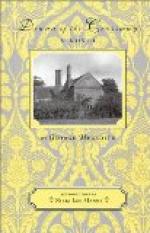The emphasis, to a gentleman acquainted with his countrymen,
was not reassuring. He had hopes of enlisting
a trustier fellow at Riddlehurst, but he was disappointed;
and while debating upon what to do, for he shrank
from leaving two women to the conduct of that inflamed
troughsnout, Brisby, despatched to Storling by an afterthought
of Lady Dunstane’s, rushed out of the Riddlehurst
inn taproom, and relieved him of the charge of the
mare. He was accommodated with a seat on a stool
in the chariot. ‘My triumphal car,’
said his captive. She was very amusing about
her postillion; Danvers had to beg pardon for laughing.
‘You are happy,’ observed her mistress.
But Redworth laughed too, and he could not boast of
any happiness beyond the temporary satisfaction, nor
could she who sprang the laughter boast of that little.
She said to herself, in the midst of the hilarity,
’Wherever I go now, in all weathers, I am perfectly
naked!’ And remembering her readings of a certain
wonderful old quarto book in her father’s library,
by an eccentric old Scottish nobleman, wherein the
wearing of garments and sleeping in houses is accused
as the cause of human degeneracy, she took a forced
merry stand on her return to the primitive healthful
state of man and woman, and affected scorn of our
modern ways of dressing and thinking. Whence
it came that she had some of her wildest seizures of
iridescent humour. Danvers attributed the fun
to her mistress’s gladness in not having pursued
her bent to quit the country. Redworth saw deeper,
and was nevertheless amazed by the airy hawk-poise
and pounce-down of her wit, as she ranged high and
low, now capriciously generalizing, now dropping bolt
upon things of passage—the postillion jogging
from rum to gin, the rustics baconly agape, the horse-kneed
ostlers. She touched them to the life in similes
and phrases; and next she was aloft, derisively philosophizing,
but with a comic afflatus that dispersed the sharpness
of her irony in mocking laughter. The afternoon
refreshments at the inn of the county market-town,
and the English idea of public hospitality, as to
manner and the substance provided for wayfarers, were
among the themes she made memorable to him. She
spoke of everything tolerantly, just naming it in
a simple sentence, that fell with a ring and chimed:
their host’s ready acquiescence in receiving,
orders, his contemptuous disclaimer of stuff he did
not keep, his flat indifference to the sheep he sheared,
and the phantom half-crown flickering in one eye of
the anticipatory waiter; the pervading and confounding
smell of stale beer over all the apartments; the prevalent,
notion of bread, butter, tea, milk, sugar, as matter
for the exercise of a native inventive genius—these
were reviewed in quips of metaphor.
‘Come, we can do better at an inn or two known to me,’ said Redworth.
’Surely this is the best that can be done for us, when we strike them with the magic wand of a postillion?’ said she.




